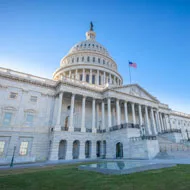 Did you know: The percentage of women-owned businesses rose from 4.6 percent in 1972 to 40 percent in 2018, but they still receive less than 4 percent of venture funding? To help change that, in June, U.S. Senators Maria Cantwell (D-WA), a senior member of the Senate Committee on Small Business & Entrepreneurship, and Marco Rubio (R-FL), the chairman of the committee, introduced legislation to improve access to capital for women-owned and minority-owned businesses.
Did you know: The percentage of women-owned businesses rose from 4.6 percent in 1972 to 40 percent in 2018, but they still receive less than 4 percent of venture funding? To help change that, in June, U.S. Senators Maria Cantwell (D-WA), a senior member of the Senate Committee on Small Business & Entrepreneurship, and Marco Rubio (R-FL), the chairman of the committee, introduced legislation to improve access to capital for women-owned and minority-owned businesses.
“Women- and minority-owned businesses are under-represented in our economy,” says Senator Cantwell. “We need to do everything we can to increase access to capital for women- and minority-owned businesses and not have the Small Business Administration (SBA) penalize them for receiving private equity investment.”
“This bipartisan bill makes it clear that women-owned and minority-owned small businesses do not have to choose between private investment to build their companies, or having access to bid on federal set-aside contracts that will help them scale and grow,” says Senator Rubio. “Importantly, the bill also spurs venture capital and private equity investments for businesses owned by either women or minorities—two groups that have been historically underserved by venture capital—and will encourage women- and minority-owned venture capital firm development. As the Senate Committee on Small Business and Entrepreneurship continues to work on a comprehensive reauthorization of the Small Business Act, I look forward to working with Senator Cantwell and my colleagues to advance the growth of entrepreneurship and access to capital in underserved communities.”
Under current law, women- and minority-owned businesses must have unconditional ownership of a 51 percent interest in the company to receive and maintain their SBA certifications. These certifications enable them to compete for U.S. government contracts, among other opportunities. However, the requirement of unconditional 51% ownership means that many women- and minority-owned businesses that receive equity investment become ineligible for these certifications.
Senators Cantwell and Rubio’s Women and Minority Equity Investment Act of 2019 would change these rules to ensure more businesses can receive capital investments, while maintaining their SBA certifications. Specifically, the legislation:
- Provides that women- and minority-owned businesses can receive private equity investment of up to 50 percent and maintain their SBA certifications
- Provides that an equity investment of 51 percent or higher from a women-owned private equity or venture capital firm would still allow a business to be certified as women-owned
- Provides that an equity investment of 51 percent or higher from a minority-owned private equity or venture capital firm would still allow a business to be certified as minority-owned
“We all know that access to capital is a barrier to entry and growth for women-owned businesses. This bill will not only assist these businesses, it will also have a positive impact on the financial industry, as it will spur growth for women-owned equity/VC firms. We applaud Senators Cantwell and Rubio for leading this breakthrough on an issue that has been an impediment to women’s business growth,” says Women Impacting Public Policy (WIPP) in a statement.
“We are pleased to see this bipartisan effort to help women overcome the hurdles they face when they want to scale their business and enter the federal marketplace,” says NAWBO National Board Chair Jeanette Armbrust. “As a bipartisan organization, we look for solutions to strengthen the economic landscape for women business owners. This bill does that. Not only will more women enter the procurement arena, but also this will open doors to more venture capital for women. I commend Chairman Rubio and Senator Cantwell on their unwavering support of the women business owners in America.”
Between 2007 and 2018, businesses owned by women increased 58 percent, while businesses owned by women of color increased 163 percent. And as of 2018, women of color own 47 percent of all woman-owned businesses. Since 1972, the number of women-owned businesses in the United States has increased by 31 times, from 402,000 to 12.3 million in 2018. Despite this rapid growth and representing 40 percent of all U.S. businesses, women-owned businesses still struggle to access the capital they need. For instance, women-owned businesses still account for less than 4 percent of total venture capital funding received. Washington state alone has more than 2,400 women- and minority-owned small businesses, with 771 holding both state and federal certifications.

